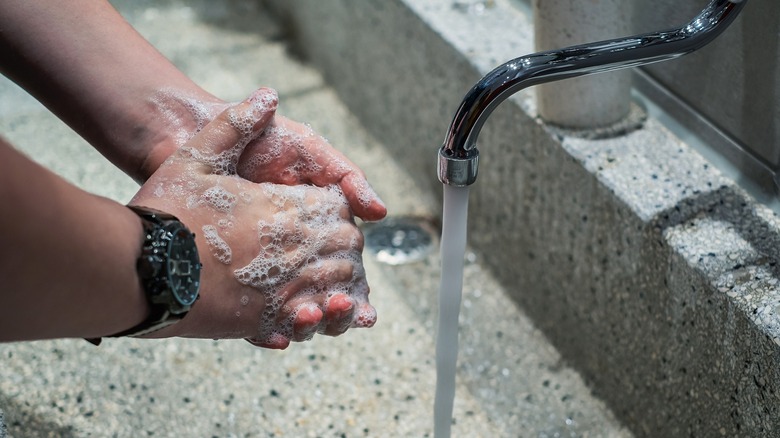Is There A Connection Between Hygiene And Alzheimer's?
Alzheimer's disease is a crippling neurodegenerative disease that causes atrophy in the brain and the subsequent death of brain cells (via the Mayo Clinic). The disease is one of the most common causes of senile dementia, which impairs a person's ability to think and function socially. Dementia impacts approximately 50 million people worldwide and, of those, anywhere between 60% and 70% have Alzheimer's disease.
Despite the prevalence of Alzheimer's, particularly in elderly patients, the National Institute on Aging notes that scientists don't yet completely know what causes the disease to develop. While not a direct cause, age is a risk factor, with the number of patients doubling approximately every five years after age 65. There are also genetic risks to consider, with a family history indicating a greater likelihood of developing the disease.
In addition to the known risk factors, there is another, lesser-known factor that could be a cause of Alzheimer's: poor hygiene. Does this mean that you're putting yourself at risk for dementia every time to skip a shower? Not necessarily, but if you're not keeping yourself clean, you could be setting yourself up for some trouble down the road.
How bad hygiene can affect you neurologically
When it comes to a link between cleanliness and Alzheimer's, it seems that one of the biggest risk factors is poor oral hygiene. A 2020 study published in the Journal of Alzheimer's Disease suggested that the bacteria that cause gum disease are also linked to the development of Alzheimer's (via the National Institute on Aging). This is a result of bacteria from inflamed gum tissue traveling from the mouth, into the bloodstream, and to the brain.
In addition, a 2019 study published in ScienceAdvances showed that the bacteria Porphyromonas gingivalis, which causes gum disease, was present in the brains of a small number of Alzheimer's patients. Similarly, a 2021 study published in Alzheimer's & Dementia: Diagnosis, Assessment, & Disease Monitoring showed that older adults with an abundance of harmful bacteria in their mouths were more likely to have a key biomarker for Alzheimer's — amyloid beta — in their cerebrospinal fluid.
On the flip side, there may be a risk that can come from being too clean. According to a 2013 study published in Evolution, Medicine, and Public Health, wealthier countries with better sanitation actually have a higher rate of Alzheimer's. This "hygiene hypothesis" suggests that cleaner environments bring with them a higher risk of allergies and autoimmune diseases. These areas lead to less exposure to diverse bacteria and viruses, which can impact the development of the immune system and expose the brain to the inflammation connected to Alzheimer's.
Stay clean, but stay healthy
There is currently no way to directly prevent the onset of Alzheimer's, but some evidence suggests that increased physical activity, cognitive training, and keeping your blood pressure under control may help (via the National Institute on Aging). In addition, it's important to maintain good oral hygiene, particularly flossing (via Babylon Dental Care).
When it comes to body care, you obviously should continue to keep clean. Regular hand washing, for example, is a good suggestion. However, it's best to stick to ordinary soap as opposed to antibacterial soap when possible (via Alzheimers.net). According to the Food and Drug Administration (FDA), antibacterial soaps contain an ingredient known as triclosan, and long-term exposure can come with a number of risks. For example, the FDA posits that triclosan may contribute to antibiotic-resistant bacteria.
Good oral hygiene, combined with regular hand-washing with natural or organic soaps, will keep you healthy in the short term. Additionally, it may also do you a lot of good, cognitively speaking, down the road.


